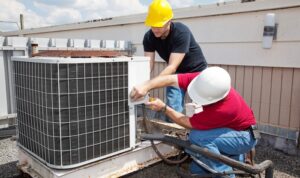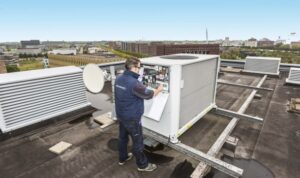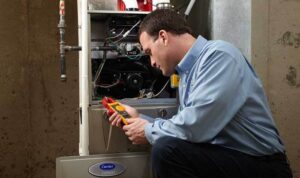When it comes to dealing with a noisy air conditioner, understanding the root causes and implementing effective solutions is key to restoring peace and quiet in your home. From identifying common sources of noise to performing necessary maintenance tasks, this guide covers everything you need to know to troubleshoot a noisy air conditioner with ease.
Let's dive in!
Causes of Noisy Air Conditioner
When your air conditioner starts making loud and unusual noises, it can be quite frustrating. Understanding the common sources of noise in air conditioners can help you troubleshoot the issue effectively.
Dirty Air Filter
A dirty air filter is a common culprit behind a noisy air conditioner. When the filter is clogged with dirt and debris, it restricts airflow, causing the system to work harder and produce more noise. Regularly changing or cleaning the air filter can help prevent this issue.
Loose Parts or Components
If you hear rattling or vibrating noises coming from your air conditioner, it could be due to loose parts or components. Over time, the vibrations from the unit's operation can cause screws, bolts, or other components to loosen. Tightening these parts can often resolve the noise issue.
Malfunctioning Fan or Motor
A malfunctioning fan or motor can also lead to loud sounds from your air conditioner. A worn-out fan blade or a faulty motor can result in grinding, squealing, or banging noises. It is essential to have these components inspected and repaired by a professional to prevent further damage.
Inspection and Maintenance
Regular inspection and maintenance of your air conditioner are essential to ensure it operates efficiently and quietly. By following these steps, you can identify and address issues that may be causing excess noise.
Visually Inspecting the Air Conditioner
- Check for any visible damage or loose parts on the exterior of the unit.
- Inspect the fan blades for any signs of wear or debris buildup.
- Look for any leaks or rust on the unit that could indicate a problem.
Checking Air Conditioner Level and Stability
- Use a level to ensure that the air conditioner is positioned correctly and is stable on the ground.
- Adjust the unit as needed to ensure it is level, which can help reduce vibrations and noise.
Cleaning the Condenser and Evaporator Coils
- Turn off the power to the air conditioner before cleaning to avoid any accidents.
- Gently brush off any dirt or debris from the condenser and evaporator coils using a soft brush or cloth.
- You can also use a mild detergent and water solution to clean the coils thoroughly.
Lubricating Moving Parts
- Regularly lubricate the moving parts of the air conditioner, such as the fan motor and bearings, to reduce friction and noise.
- Use a lubricant recommended by the manufacturer for optimal results.
- Ensure to follow the manufacturer's guidelines for lubrication frequency to maintain smooth operation.
Airflow Restrictions
Blocked or dirty vents can significantly impact the airflow of your air conditioner, leading to increased noise levels. It is essential to regularly check and clean vents to ensure proper air circulation within your home.
Checking and Clearing Debris Around the Outdoor Unit
One common cause of restricted airflow is the presence of debris around the outdoor unit of the air conditioner. To address this issue, make sure to clear any leaves, dirt, or other obstructions that may be blocking the airflow. A build-up of debris can not only cause noise but also reduce the efficiency of your air conditioner.
- Regularly inspect the area around the outdoor unit and remove any debris that may be present.
- Trim back any vegetation or shrubbery that could be obstructing the airflow.
- Ensure that there is at least two feet of clearance around the unit to allow for proper ventilation.
Inspecting Ductwork for Obstructions
In addition to checking the outdoor unit, it is crucial to inspect the ductwork for any obstructions that may be causing airflow restrictions and noise. Leaks, blockages, or kinks in the ducts can all contribute to a noisy air conditioner.
- Visually inspect the ductwork for any visible signs of damage or blockages.
- Use a flashlight to look for obstructions such as dust, debris, or mold inside the ducts.
- Consider hiring a professional to conduct a thorough inspection and cleaning of the ductwork if needed.
Professional Service and Repairs
Seeking professional help for diagnosing air conditioner noise is essential when the issue persists despite basic troubleshooting. HVAC professionals have the expertise to identify the root cause of the noise and recommend the necessary repairs or adjustments.
Benefits of Regular Maintenance by HVAC Professionals
- Ensures optimal performance and energy efficiency of the air conditioner.
- Extends the lifespan of the unit by addressing potential problems early.
- Helps avoid costly repairs in the long run.
- Improves indoor air quality by keeping the system clean and well-maintained.
Importance of Timely Repairs
- Prevents further damage to the air conditioner components, which could lead to more noise and malfunctions.
- Ensures the safety of the unit and reduces the risk of breakdowns during hot weather.
- Maintains the warranty validity by following the manufacturer's repair guidelines.
Choosing a Reputable HVAC Technician
- Look for certifications and licenses to ensure the technician is qualified to work on air conditioning systems.
- Read reviews and ask for recommendations from friends or family to find a reliable service provider.
- Inquire about the technician's experience and specialization in dealing with noisy air conditioners.
- Request a detailed estimate of the repair costs and compare it with other service providers before making a decision.
Final Wrap-Up
In conclusion, addressing a noisy air conditioner requires a systematic approach that involves inspection, maintenance, and potential professional assistance. By following the steps Artikeld in this guide, you can enjoy a quieter and more comfortable indoor environment. Say goodbye to loud AC units and hello to tranquility!
FAQ Summary
How often should I clean the air filter of my air conditioner?
It's recommended to clean or replace the air filter every 1-3 months to ensure optimal performance and reduce noise levels.
Why is it important to check the level and stability of the air conditioner?
An unlevel or unstable unit can lead to vibrations and increased noise during operation. Ensuring proper alignment helps maintain a quieter system.
What are the benefits of professional maintenance for my air conditioner?
Professional maintenance can prolong the lifespan of your unit, improve efficiency, and address potential issues before they escalate into major problems, including noise disturbances.



